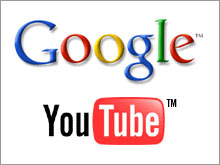YouTube rivals: Thanks, Viacom!Viacom's lawsuit against Google and YouTube could present an opportunity for smaller online video firms to make some noise.NEW YORK (CNNMoney.com) -- Viacom, with its lawsuit seeking more than $1 billion in damages from Google and YouTube, has shown that it's serious about copyright infringement. But several of YouTube's rivals say they are not concerned about big media companies coming after them since they think they are already playing by the rules.
"I don't know if YouTube had it coming but I'm surprised it took this long for a lawsuit. A lot of value has been created from illegal actions and inappropriate use of material," said Daniel Todd, president and co-founder of Zango, an online video and gaming site. Zango is just one of many privately held companies that sense an opportunity to gain ground in the still nascent online video world now that YouTube and Google (Charts) have put on legal notice by Viacom (Charts), the owner of popular cable networks MTV, Nickelodeon and Comedy Central. While YouTube does have partnerships with some established media giants, the Viacom lawsuit is a clear indication that media firms are still wary of working with search industry leader Google and its online video subsidiary YouTube. Copyrighted material often gets posted on YouTube by users, and Viacom claims YouTube is slow to remove the pirated clips. But other online video companies say that it's not that difficult to flag and take down illegally posted content. Greg Kostello, chief executive officer of VMIX Media, an online video company that runs Vmix.com, which has partnerships with GE (Charts)-owned NBC and News Corp. (Charts)-owned Fox, says his site has employees that manually look at videos for copyrighted content. "We are very careful to be protective of artists' rights, from the up and coming individual filmmaker to big media companies. We monitor uploads and filter out illegal content," Kostello said. "Online video companies that don't do that could be in trouble. The media companies spend billions of dollars a year to produce entertainment so I think they have the right to manage it the way they choose." Erick Hachenburg, CEO of popular online video site Metacafe, agreed. He did say, however, that sites like his and YouTube should not be responsible for "policing" their sites. He believes that when a media firm asks them to take down a video, they will take it down. But he thinks that one thing that may be hurting YouTube and other sites is that once copyrighted videos are removed, it doesn't take long for them to reappear. And that, he said, is something that he claims does not take place on Metacafe, since the company has technological filters in place to prevent something that already has been flagged as copyrighted material from getting back on the site. "The important difference for us is once we pull something down, it stays down. If you try and put up same video or something similar, we don't let that get reposted," Hachenburg said. Other online video companies also say that the Viacom lawsuit helps validate them since it highlights the importance of companies that specialize in working with mainstream media firms. "This will continue to put in motion a sense from copyright holders that they need to assert more control over their distribution. Looking at the big picture, this is very positive for commercial online video firms," said Jeremy Allaire, CEO of Brightcove, an online video company that has partnerships with The New York Times Co. (Charts), Walt Disney's (Charts) Buena Vista TV unit and AOL. AOL, which like CNNMoney.com is a division of Time Warner (Charts), also is an investor in Brightcove. To that end, another online video firm, Break.com, which caters mainly to young men, announced Wednesday that it is working with NBC Universal on an online program that will be created exclusively for the Web. "Media is paying attention to online video and recognizing that it is important. That's different than where we were two years ago today," said Keith Richman, CEO of Break.com. "I find it ironic that the same studio producing Heroes for TV is producing an original series for Break.com." Still, Google does not appear to be too concerned about increased competition and what effect the lawsuit may have on YouTube's business. "YouTube has become even more popular since we took down Viacom's material. We think that's a testament to the draw of the user-generated content on YouTube. We've been very successful forging thousands of successful partnerships with content owners -- like Warner Music, Sony/BMG, Universal Music, BBC, and the NBA -- interested in finding new audiences for their programming," said Kent Walker, Google's general counsel, in a statement. "These partnerships offer the YouTube community access to some of the best content in the world, ranging from entertainment and sports to politics and news. And we're only getting started," Walker added. But not everyone agrees. "The failure to achieve a long-term business model is going to clearly hurt YouTube. They have to come up with a business model that works. There are clearly a lot of competitors lining up that want to take a shot at YouTube," said Bruce Davis, chief executive officer of Digimarc, a company that has developed digital watermarking technology to help identify and protect media content.
The reporter of this story owns shares of Time Warner through his company's 401(k) plan. |
| ||||||||


